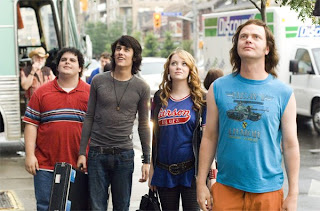Magnus Mills
 By Murissa Shalapata
By Murissa Shalapata As I collect more upper-year University courses I begin to enjoy it more and more. I have just finished my third year and have been pushed more so than previous courses and finding that I am excelling. Books that are meaningful by authors that are and enjoyable are presented to the students, and as I demonstrated with my last post, new discoveries are coming up everyday week.
Traditional essays are my least favorite thing to write, but I did so comparing two authors: Jack Kerouac and Magnus Mills. These are two authors that could not be more different in aesthetic or content or generation, but nonetheless I enjoyed both thoroughly. This post, as you could have guessed from the title is devoted to Magnus Mills.
This contemporary author writes enjoyable 'little' stories about strange characters in a world that is similar to our own but not quite the same. That is the only way I can put it really. His aesthetic is minimalist, which I find suits the shorter stories and even his content. As a writer this was quite a revolutionary but simple and obvious epiphany; The aesthetic reflects the content and vise versa. I find this to be true when it comes to novels anyways, and the same goes for Kerouac.
In Mills' book "Three to See The King" he writes about a simple man living in a basic house made of tin. The book starts off "I live in a house built entirely from tin, with four tin walls, a roof of tin, a chimney and door. Entirely from tin" (Mills 1). The whole book is written with basic relatively short sentences like this. These type of minimalist sentences are describing a man with a minimalist life, alone in a house of tin.

I am sure you are thinking that it is a fairly strange sounding book but I assure you it is a unique read, not only with its subject
but also for writing purposes. As the book continues the man in the house of tin receives unique visitors who begin to invade his space and people begin to corrupt his 'uniqueness' (which he has always wanted to be and clearly living in a house of tin is) until just around the hill a town of tin houses begin to form. Magnus Mills delivers this story with little gems of 'deadpan' humor which is quite popular today and we see it often with television shows like 'The Office', 'Arrested Development', comedians like Garry Shandling, Ricky Gervais, and Seth Rogan.
So since last posting I asked if you knew your own aesthetic, which only a few people even attempted to answer, I now ask you if you admire a certain type/genre/aesthetic of writing? Are you inspired by others?As a writer do you read a book for more than just the story?
This is my challenge for anyone currently reading or about to start a new book. Read as a writer would, and ask yourself why has the author chosen to portray the story through this particular aesthetic, and try to decipher the aesthetic they use. It is quite a challenge but you learn a lot from it. If you're looking for a quick and interesting read, or want to get a few books in this summer, I highly recommend Magnus Mills.
Thanks to the following websites for the photos
http://www.barcelonareview.com/13/e_mm_int.htm
http://ecx.images-amazon.com/images/I/51Hf5NHqgzL._SL500_AA240_.jpg
http://www.comicmix.com/contributor/josh-wigler/4/
Stay tuned for next posting! Las Vegas reviews of Cher, Love and more. Let me know if there is anything you would like to know more about in that crazy town.

Interesting post, Murissa. I'm currently doing a series of poems which I'm taking directly out of my prose manuscripts, and I'm distilling usually one scene into a poem. This forces me to use a highly minimalized version of my own style, which tends to be much wordier than it needs to be in a prose first draft version.
ReplyDeleteWhen I do regular revisions, I'm always paring my sentences down. But to turn my prose into poetry really forces me to rethink elements that are necessary to tell the story. It's been challenging and invigorating at the same time.
Magnus Mills' work sounds very, very intriguing.
It would be interesting if you read authors of minimalist poetry and then compared to see if what you're doing is similar to how they compose poetry, with line breaks, the vocabulary you use, wether it is ornate or basic, etc.
ReplyDeleteOr are you more of an imagist poet, which I find very difficult to execute even though I understand the concept.
What kind of poetry would you say your work is?
Yes, I'd say I'm very concerned with creating an image in the reader's mind - clear, concise choice of wording. I don't try to draw attention to the form of the poem itself by creating line breaks - I use line breaks to accentuate a mood or an image.
ReplyDeleteInteresting post Murissa - coming from a journalism and film/tv background my approach to writing tends to be minimalist - at least it was - now I'm finding I need to expand more because I'm trying my hand at genre fiction - where the prose is different from what I'm used to writing - but I've been reading a lot with that similar eye you mentioned. I watch movies in the same way - I was a movie reviewer for several years so when I watch a movie or a TV show I am also watching for certain stylistic elements. Obviously you can still enjoy watching or reading - but you're paying attention to how it's put together as well as opposed to just following a story.
ReplyDeleteI am very interested in becoming a movie reviewer. How did you do it? Did you enjoy it? How did you break in?
ReplyDelete